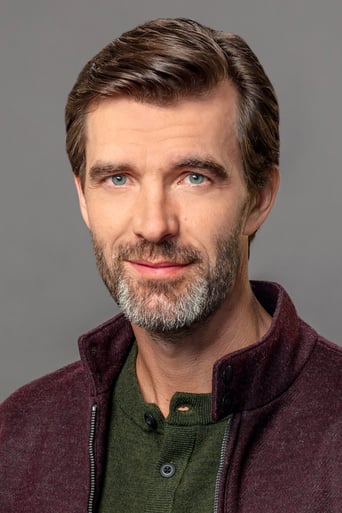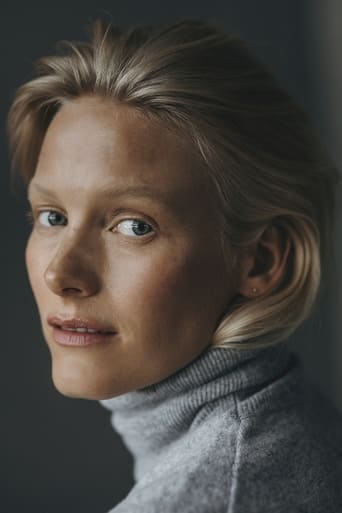TrueJoshNight
Truly Dreadful Film
Dorathen
Better Late Then Never
WillSushyMedia
This movie was so-so. It had it's moments, but wasn't the greatest.
Francene Odetta
It's simply great fun, a winsome film and an occasionally over-the-top luxury fantasy that never flags.
Reno Rangan
A biographical film set in the 17th century about the queen of Sweden. If a film was made based on the real means it has to be something very important thing to tell us like about the person or the historical events surrounding that person. It is a good film to learn the history of that part of the world if you do not belong there, and even for the natives with less knowledge about it. Multi- nationally produced film with a decent cast and production in the English language despite a Scandinavian tale.Besides, it is also a lesbian theme and one of the oldest real account I have seen in a film. Even today, not the whole world accepts it with the open arm. So on that perspective, I was curious about the film. Not to know how the film was made, but how they are, the real people dealt with such sexual concept in those days. Particularly, how the people around reacted to it. On that topic, the narration was not explicit. That means watching it expecting one of the best among its kind is a disappointment. But the film offers more from other angles of importance.After her father's death, the young Kristina was trained all her childhood to be the next ruler of the Sweden. When she came of age to take the crown, her aim is to mark the presence of Sweden all over the Europe. She's a fine sword woman, but also very interested in philosophy and art. But she has never been so confused as one day when she felt something for a woman in her court. She begins to learn more about it from an expert and on the other side, her duty to the nation and its people seems not getting better. How the fate of Sweden and her personal life collides covered in the remaining parts.❝I know how to set a bear trap, how to clean a musket, but I don't know how to place my lips on yours.❞The film was not received well. Critically failed, but it was not that bad if you ask me. Yes, it was boring in parts, due to lack of progression. There's lots of things happened in the story, yet seems was not enough to impress its viewers. Especially switching between national duty and personal affairs strongly collides. Thus leaving both the subjects behind half baked. The real events took place for decades was put into a hundred minutes film did not justify. It's particularly about picking the right story segment to add in the screenplay and the some of the parts looked fine, but not the overall film.On the other hand, some people might find it a propaganda. Protestants, Roman Catholic, I don't know which way it leans, but started with one way and ended with another. So it could be the end that counts. On the humanitarian ground, morally, all looked fine to me. So if that's what made this film to become prey, then it's a totally wrongly judged. Otherwise the film is acceptable for being a biopic, telling the truth. Of all the kings and queen of the world we learnt about, Kristina is different and one should know about her for that. I feel she was very modern and modern in the wrong century.Born in the royal family, had all the power, it's very sad how her fate has changed at the end. But that's not the end of her tale. There's more to reveal, though this film covered only that takes place in the Sweden and being the ruler. I'll be happy if a sequel was made to tell her latter life and self-discovery. I'm sure it would be more a philosophical, but some people might raise the voice propaganda. Since this flick did not do well, that's not going to happen, I guess.One of the reasons I wanted to watch it was Sarah Gadon. She was in one of the main roles, but had a less preference. The other actress was really good and she was almost in every frame of the film. It might not be the best film to represent the LGBT, but it had its share and definitely a decent film from all the other angles. Should have been better, that's what those who saw it would say and so am I. Once watchable, but it does not have quality to I say the word, recommended!6/10
Sindre Kaspersen
Finnish screenwriter, producer and director Mika Kaurismäki's feature film which he produced and which was written by American literary translator Linda Gaboriau and Canadian screenwriter Michael Marc Bouchard, is inspired by a play and real events. It premiered in Canada, was shot on locations in Finland and Germany and is a Finland-Canada-Sweden-Germany-France co-production. It tells the story about a Swedish foster child named Christina Augusta (1626-1689), born in a royal castle called Three Crowns (1697) in Stockholm, Sweden into the Swedish Empire (1611-1721), made queen-elect (1632) and sovereign in (1644).Distinctly and precisely directed by Finnish filmmaker Mika Kaurismäki, this quietly paced and somewhat fictional tale which is narrated mostly from the protagonist's point of view, draws a concentrated portrayal of a majestically educated Queen of Sweden, Princess of Finland, Duchess of Estonia and Lady of Ingria and Wismar who had a lady-in-waiting and foster mother surnamed Leijonhufvud (1639-1644), was crowned King of Swedes, Goths and Vandals and who relinquished her rule, abdicated, went to Innsbruck, Tyrol in Austria and named herself Christina Alexandra (1654). While notable for its atmospheric milieu depictions and cinematography by cinematographer Guy Dufaux, this dialog-driven and narrative-driven story about interdependence and autonomy and the distinct distinction between a human being and a religion was made more than eight centuries after a town called Stockholm (1252), seven centuries after Heidelberg University (1386) in Germany, five centuries after an Italian 16th century painter's work portraying an Italian consecrated virgin forenamed Lucia (1521), the House of Vasa (1523-1672), an English ship named Mary Willoughby (1536), Danviken Hospital (1558-1861), a liturgy called "The Red Book" (1577), the quote: "Uneasy lies the head that wears a crown." from Henry IV, Part II (1597), four centuries after the Protestant Union of Germany (1608-1621), the Catholic League of Germany (1609-1635), a Swedish confidant named Axel Gustafsson Oxenstierna (1583-1654) became Lord High Councillor of Sweden (1612), the Second Defenestration of Prague (1618), a Scottish-English Electress of Palatine (1085-1803) named Elizabeth Stuart (1596-1662) was crowned Queen of Bohemia (1619), Great Children's House (1624-1785) in Queen Street (1639), Stockholm, in Sweden, the Instrument of Government (1634), a Swedish countess called Catherine of Sweden (1548-1638) was appointed (1636) guardian of the child of a German Queen Dowager named Maria Eleonora of Brandenburg (1599-1655), Battle of Prague (1648), the Peace of Westphalia (1648), a Swedish courtier and maid of honour named Ebba Magnusson Brahe (1596-1674) petitioned Queen Christina and thereby succeeded in creating a city called Jacobstad in Finland (1652), four centuries after Accademia degli Arcadi (1690) in Rome, Italy, a poet, in a poem, possibly created Mother Svea (1672), three centuries after an English-Scottish gardener named Philip Miller (1691-1771) named a life Acacia (1754), a Swedish physician described a life called the White Butterfly which he named Pieris rapae and the yellowhammer (1758), Stockholm Palace (1760) and a Swedish stage actress named Ester Lovisa Sofia Augusti Solomon (1756-1790) became a court singer (1773) and the Catholic Church in Sweden (1781).Made three centuries after a locality was named Vilhelmina (1804) after a German Queen consort named Friederike Dorothea Wilhelmina of Baden (1781-1826) who in 1797 was married per procura, the House of Bernadotte (1810), a Danish poet nicknamed Mother Koren referred to herself as "the noble abused foster daughter." (1814), two centuries after Wallin Girl's School (1831-1939) in Sweden, a Swedish Illis Quorum recipient named Carin Sophie Adlersparre (1823-1895) attended a finishing school (1836-1838), a Swedish instrumentalist named Marie Pauline Landby Åhman (1812-1904) started working (1851) at the Royal Swedish Orchestra (1526), a Scottish-Swedish governess named Jane Miller Thengberg (1822-1902) created a Girl's School for education of women teachers in Uppsala, Sweden called Klosterskolan (1855-1863), Riksdag (1866) in Sweden, an Icelandic painting called "Lady of the Mountain" (1866), Långholmen Prison (1880-1975), the birth of a Swedish chairperson named Signe Wilhelmina Ulrika Bergman (1869-1960) who participated in the Sixth Conference of the International Women's Suffrage Alliance (1911), an English art model named Lady Edith Villiers (1841-1936) became Lady of the Bedchamber (1895), a Swedish Madame named Gertrud Virginia Adelborg (1853-1943) authored a writing regarding women's political right to vote (1898), a Swedish poet lived at a place nicknamed the Blue Tower (1908-1912) and a royal UK training ship named HMS Clio (1858-1919) was certified for the reception of boys (1908), a term called the Electra complex (1913), ninety-four years after a Swedish social worker named Nelly Maria Thüring (1875-1972) became a member of the Riksdag (1921), eighty-two years after a feature film starring a Swedish actress named Greta Lovisa Gustafsson (1905-1990) called "Queen Christina" (1933), sixty-nine years after a Swedish author named Elin Matilda Elisabet Wägner (1882-1949) who was a teacher at Fogelstad Citizen School for Women (1922-1954) became a member (1944) of the Swedish Academy (1786), a singer with names meaning foreign and dweller in the valley sang: "Alas my love you do me wrong to treat me so discourteously … I sent thee kerchiefs for thy head ... that made thee be our harvest queen … fare thee well, adieu …" (1959), thirty-nine years after the Instrument of Government (1974), a Swedish author surnamed Norén wrote: "Song about woman's revolting roles" (1976), ten years after Equal Pay Day (2005), seven years after a voice sang within the mirror's edge: "… no shadows … red lights … let it … racing through …" (2008), contains a great and timely score by composer Anssi Tikanmäki.This versatile retelling which is set in Sweden in the 17th century and where an Empress regnant of peace silences those at Her Majesty's Pleasure asking for a successor by committing a Most Excellent act where she declares her first cousin her son, is impelled and reinforced by its cogent narrative structure, substantial character development, rhythmic continuity, comment by Her Majesty: "I will have a private audience with whom I please." and the immediate acting performances by Swedish actress Malin Buska and Finnish actress Laura Birn. A dynastic narrative feature.
maurice yacowar
Mika Kaurismaki's Queen Christina of Sweden (Malin Buska) is tall, beautiful, and without a hump on one shoulder, but otherwise she's a fair representation of the historic figure. In her restless spirit, intellectual appetite, impatience with the patriarchy and her lesbianism she's a much more accurate representation than Rouben Mamoulian's (Garbo in Queen Christina, 1933). Of course Kaurismaki opts to revive the 17th Century Christina story now because it's a sharp reflection of our times. I don't know how Swedes or Finns will see their lives in this film, but much of it rings clear for North America and Europe today. The film bristles with pertinence, like the male advisor's "Peace doesn't fill our coffers" and her "Austerity is sadistic."Christina's advocacy of peace, culture, the arts, make her a model for modern leadership. In her refusal to accept male authority, especially not to allow any man to claim her as a field he can plow for his pleasure, she is the prototypal feminist. Sadly, the contemporary also limns through her ultimate defeat by the male authority and their rejection of her same-sex passion as "deviance." Her male counsellors conspire against her, drive off her beloved, and drive Christina into madness, until she escapes. We're still hung up on the questions she poses to Descartes: what is love, how do we deal with it, how can we free ourselves from it. We still crave the freedom to define our own destiny and escape our inherited structures and strictures. If we've moved beyond Descartes' assumption that our emotions have a physical source, we continue to build upon his confidence in empirical evidence and in the essential use of reason. But another Cartesian statement propels the film: To find the truth we must abandon everything we have learned or assumed and establish a new understanding of our world. This is the triumph of discovery over habit, reason over delusion, freedom over "destiny." This is how this Christina constantly flies in the face of what she has been taught and what is expected of her. Her escape is ironic. Her advisors having long insisted she marry to produce a clear heir to the throne, she now proclaims one suitor her son and bestows upon him her royal authority. With a quarter of the treasury she departs to Rome, where she converts to Catholicism and enjoys the life of secular culture and stimulation she has craved. As one counsellor bitterly observes, having rejected all her male suitors she settles into life under the authority of the Pope. The last shots, however, play her as exulting in openness, freedom and the light the Swedish court and "thinkers" denied her. She abandons her throne and power to recreate herself in Rome. Now, here's the crowning irony. Mika and younger brother Aki Kaurismaki are famous for acerbic contemporary stories about inarticulate, hard drinking, ugly and lugubrious losers, steeped in 1950s rock and roll. Nobody in a blind test would guess The Girl King is a Kaurismaki film. But here the director does what his heroine does and what her healthiest mentor, Descartes, prescribed. To find the truth, to see how Queen Christina reflects upon our current reality, Kaurismaki discarded his customary period, his familiar genres and his signature style, then and bathos — to make something completely new. And true to our day as it is to his subject's.
Irishchatter
I wouldn't consider this the best movie I've ever seen but it was quite interesting about Queen Christina and her lesbian affair with Ebba Sparre, her lady-in-waiting. I suppose, it was rather interesting to go deep into her short term as a leader of Sweden. I never even heard of her before until today, I saw this movie. I reckon if you live in Sweden, you would know who Queen Christina is. I have to say Malin Buska is a good Swedish actress in this, she reminds me of Kirsten Dunst with her beauty. I liked in the film that herself and Sarah Gadon relationship were in a dangerous love together. It does make the film feel powerful and so Victorian! Although I didn't like in this film that the scenes dragged on and this film is nearly 2 hours, it should've been an hour and 16 minutes. It would do rightly and earn 10 stars. If you like watching Victorian then you'll like this!







